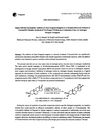 3 citations,
January 2012 in “Elsevier eBooks”
3 citations,
January 2012 in “Elsevier eBooks” The document says that there are treatments for hair and nail diseases.
 27 citations,
January 1984 in “Pharmacology & Therapeutics”
27 citations,
January 1984 in “Pharmacology & Therapeutics” Antiandrogens have important biological effects, but more research is needed to understand them fully and compare their effectiveness and side effects to other treatments.
 82 citations,
August 2006 in “Pharmacology, Biochemistry and Behavior”
82 citations,
August 2006 in “Pharmacology, Biochemistry and Behavior” Certain steroids in the brain affect mood and symptoms of depression, and treatments targeting these steroids show promise for improving these symptoms.
 151 citations,
May 2014 in “American Journal of Clinical Dermatology”
151 citations,
May 2014 in “American Journal of Clinical Dermatology” Effective treatments for male pattern baldness include oral finasteride and topical minoxidil, while topical minoxidil is best for female pattern baldness.
 11 citations,
December 2014 in “Clinical Obstetrics and Gynecology”
11 citations,
December 2014 in “Clinical Obstetrics and Gynecology” Obstetrician/gynecologists can diagnose and manage female hair loss with careful history taking and examination.
 174 citations,
November 2002 in “Expert Reviews in Molecular Medicine”
174 citations,
November 2002 in “Expert Reviews in Molecular Medicine” Hair loss needs more research for better treatments.
 October 2023 in “Biomaterials”
October 2023 in “Biomaterials” Nanotechnology could improve hair regrowth but faces challenges like complexity and safety concerns.
 126 citations,
January 2009 in “International Journal of Trichology”
126 citations,
January 2009 in “International Journal of Trichology” Oxidative stress contributes to hair graying and loss as we age.
 January 2020 in “Asian journal of applied science and technology”
January 2020 in “Asian journal of applied science and technology” Good nutrition is crucial for health and preventing disease, and supplements can help prevent nutrient deficiencies.
 1 citations,
December 2010 in “InnovAiT”
1 citations,
December 2010 in “InnovAiT” The document concludes that accurate diagnosis and appropriate management are crucial for treating various hair disorders, which have significant psychological impacts.
 1 citations,
August 2024 in “Polymers”
1 citations,
August 2024 in “Polymers” The P25H5-O microneedles effectively deliver substances through hair follicles and are safe for skin cells.
 August 2023 in “International journal of basic and clinical pharmacology”
August 2023 in “International journal of basic and clinical pharmacology” Herbal hair serum promotes natural hair growth and maintains healthy hair.
 1 citations,
January 2010 in “Springer eBooks”
1 citations,
January 2010 in “Springer eBooks” Certain micronutrients may improve hair and nail health, but more research is needed to confirm their benefits.

Combined oral minoxidil and finasteride significantly improve hair density in men with male pattern baldness.
 February 2024 in “ACS Omega”
February 2024 in “ACS Omega” The Shen Bai Hair Growing Decoction may help treat hair loss by promoting hair growth and reducing inflammation.
 November 2023 in “Translational Medicine Communications”
November 2023 in “Translational Medicine Communications” Derinat may improve hair growth and quality of life in hair loss patients by reducing oxidative stress.
 13 citations,
January 2016 in “Journal of cosmetology & trichology”
13 citations,
January 2016 in “Journal of cosmetology & trichology” Alternative treatments show promise for hair growth beyond traditional methods.

Mealworm extract may help prevent hair loss and promote hair growth due to its antioxidant activity.
 8 citations,
December 2011 in “Journal of Medicinal Food”
8 citations,
December 2011 in “Journal of Medicinal Food” D-004 may be a natural alternative to finasteride for treating enlarged prostate and male baldness.
 14 citations,
February 1994 in “Tetrahedron Letters”
14 citations,
February 1994 in “Tetrahedron Letters” Adding cerium(III) chloride to Grignard reagents improves the making of compounds that could treat prostate issues and hair loss.
 14 citations,
March 2022 in “Journal of Biomedical Science”
14 citations,
March 2022 in “Journal of Biomedical Science” Cyanidin 3-O-arabinoside may help treat a common form of hair loss by protecting cells against aging and improving cell function.
 October 2020 in “Veterinary Dermatology”
October 2020 in “Veterinary Dermatology” New treatments and diagnostic methods for various animal skin conditions showed promising results.
 44 citations,
March 2012 in “Fitoterapia”
44 citations,
March 2012 in “Fitoterapia” Germacrone from Curcuma aeruginosa may help treat conditions related to male hormones by blocking a specific enzyme.
 1 citations,
January 2022 in “Faculty reviews”
1 citations,
January 2022 in “Faculty reviews” The best long-lasting results in treating hair loss may be achieved through combination therapy, including treatments like finasteride, minoxidil, and platelet-rich plasma injections.
 81 citations,
June 2010 in “Journal of Dermatological Treatment”
81 citations,
June 2010 in “Journal of Dermatological Treatment” The document concludes that minoxidil and finasteride are proven for hair growth, herbal remedies show promise, but more research is needed to confirm their effectiveness.
 1 citations,
July 2017 in “Clinical research in dermatology”
1 citations,
July 2017 in “Clinical research in dermatology” Hair loss, known as Androgenetic Alopecia, is often caused by hormones and can be diagnosed using noninvasive techniques. Treatments include topical minoxidil and oral finasteride, with new treatments being explored. There may also be a link between this type of hair loss and heart disease risk.
 29 citations,
February 2007 in “Hormone and metabolic research”
29 citations,
February 2007 in “Hormone and metabolic research” Blocking the androgen receptor in skin cells reduces their growth response to male hormones, suggesting a possible treatment for skin conditions linked to androgens.
 305 citations,
February 2007 in “Hormone and metabolic research”
305 citations,
February 2007 in “Hormone and metabolic research” Human skin makes sexual hormones that affect hair growth, skin health, and healing; too much can cause acne and hair loss, while treatments can manage these conditions.
24 citations,
February 2012 in “Prostate cancer and prostatic diseases” 5α-reductase inhibitors help shrink the prostate, improve urinary symptoms, and may reduce prostate cancer risk.
3 citations,
January 2021 in “Journal of dermatology & cosmetology” Current alopecia treatments manage symptoms but don't cure, and better treatments are needed.




























